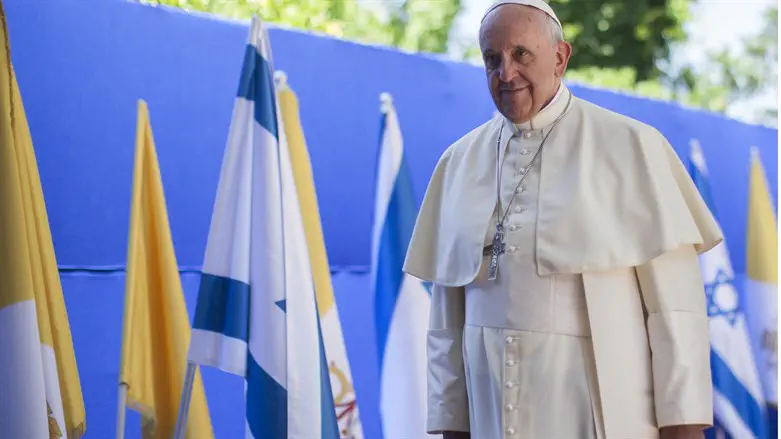
A B’nai B’rtih International delegation recently met with Pope Francis at the Vatican.
Led by B’nai B’rith President Seth J. Riklin and CEO Daniel S. Mariaschin, the multinational delegation sought to build upon strides in Catholic-Jewish relations and further advance peace and partnership in the Middle East.
Pope Francis told B’nai B’rith that he had been “tirelessly committed to humanitarian causes” and urged “remembrance of the Shoah.”
“Even before I became Pope, the promotion and deepening of Jewish-Catholic dialogue was something close to my heart,” he said.
In formal remarks, B’nai B’rith urged active support for the expansion of the Abraham Accords and called out Iran for threatening the annihilation of the Jewish state. They also positively cited governments’ adoption of an International Holocaust Remembrance Alliance working definition of antisemitism.
“As President of B’nai B’rith International — the oldest Jewish communal organization, founded in 1843 in New York, an organization that is profoundly committed to interreligious dialogue and partnership — it is my great honor, on behalf of our brothers and sisters across six continents, to give you our heartfelt thanks for receiving us today,” Riklin told Pope Francis.
“This time that we share today can be a much-needed source of real hope, even inspiration, to people of faith around the world. As during previous audiences that we have been fortunate to have with you and your predecessors, we cannot but marvel at the blessed and bold transformation in Catholic-Jewish relations that has occurred in a short period of time. To the brave heroes who are responsible for this historic transformation, we can only offer our enduring gratitude. From clergy to laypeople to seminarians, the work of strengthening our sacred friendship continues — founded upon the indelible bonds of our two religions.”
Riklin commented that there is a growing sense of optimism in the era of the Abraham Accords: “The signatories to those Accords have made the principled choice of peace and mutual acceptance with Israel, resulting in wide-ranging cooperation and engagement between their peoples. There has been a growing realization that the political strategies of the past have failed to solve the problems facing the Middle East. Through this realization, the people of these countries, Muslims and Jews together, have found the core values that they share, that they are indeed ‘cousins,’ and, as a result, we are now beginning to see how much our familial faiths can achieve together.”
He urged that “all of us should support this reconciliation and encourage its expansion — for the sake of all people.”
Riklin continued, lamenting that “sadly, it cannot be denied that some malevolent forces are determined to create and widen divisions amongst peoples through all forms of bigotry and hate, using incitement to cause violence and conflict.”
“Despite the very small size of the Jewish people, anti-Semitism remains one of the most virulent hatreds, online and in real life,” he said. “Despite the very small size of Israel, the citizens of the Middle East’s only pluralistic democracy continue to be demonized, delegitimized and subjected to violent terror attacks.”
He called out the Iranian government for continuing to “openly pledge the very annihilation of Israel and to fund proxies’ continued threats to and attacks upon Israel” and also criticized the UN, where “Israel has been condemned more than all other countries combined, a means to distract from other countries’ human rights violations.”
“Yet, there has been progress. Thankfully, a long list of countries have adopted the International Holocaust Remembrance Alliance working definition of anti-Semitism,” he said. “The definition critically identifies prejudice against Jews both as a faith group and as an ancient but living people.”
Riklin ended his comments, calling for the world to unite against antisemitism.
“Your Holiness, we hope that all people will stand together against antisemitism, against anti-Christian discrimination and against intolerance directed at Muslims. In recognition of our common home and common destiny, let us protect the environment, care for the most vulnerable and promote mutual understanding rather than mutual recrimination.”
The delegation also met with Italian Foreign Minister Luigi Di Maio, with other officials and diplomats, and with the leadership of the Italian Jewish community.
(Israel National News' North American desk is keeping you updated until the start of Shabbat in New York. The time posted automatically on all Israel National News articles, however, is Israeli time.)
